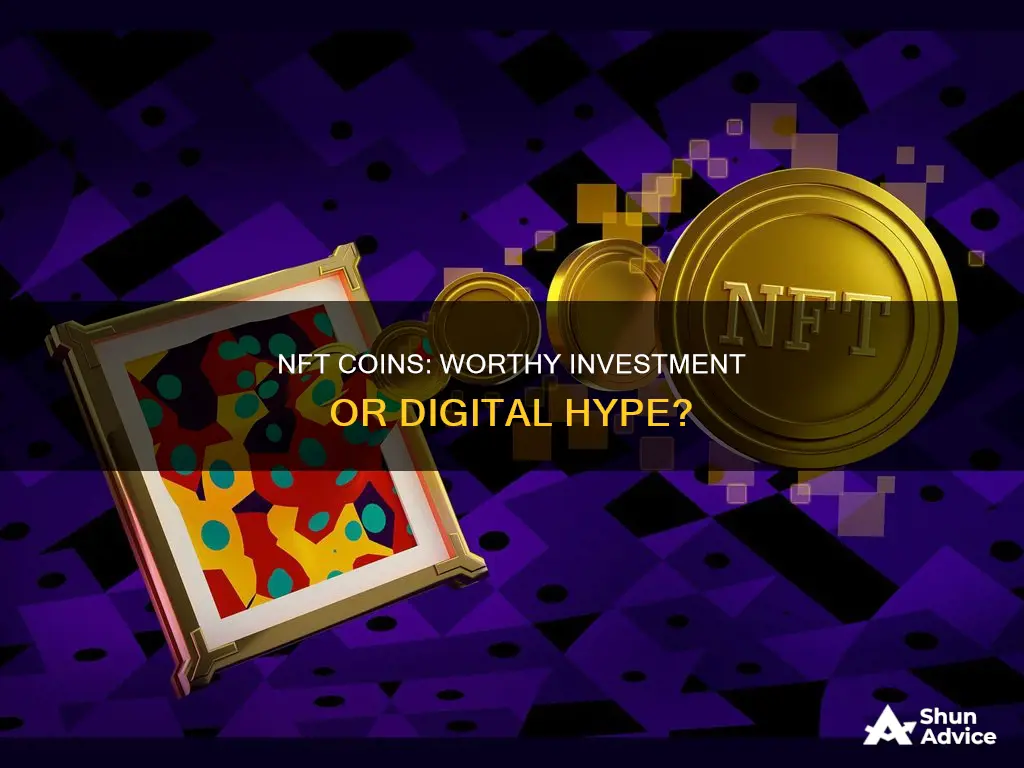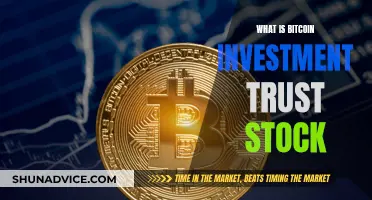
Non-fungible tokens (NFTs) are unique digital assets that have gained popularity as a way for creators to monetise their work. NFTs are similar to cryptocurrencies in that they are recorded on blockchain ledgers, but they differ in that NFTs represent ownership of a digital or real asset. NFTs can be a good investment for experienced traders or those with a track record of identifying good investment opportunities, but they are a very risky asset class, even more so than cryptocurrencies. NFTs are subject to market manipulation, fraud, scams, and money laundering, and the lack of market regulation makes it difficult to vet the physical goods purported to be the tokenised asset. Additionally, the non-fungible nature of NFTs means that the market is illiquid, and it can be difficult to sell NFTs quickly without undercutting other sellers. Nevertheless, NFTs can be a lucrative investment for those who understand the risks and are willing to take them.
| Characteristics | Values |
|---|---|
| Accessibility | NFT markets have a broad and global reach, allowing anyone in the world with a working computer, an Internet connection, and knowledge of transacting on NFT marketplaces to invest. |
| Memorialization of portable contracts | NFTs can digitally signify from an app or website any item that benefits from having its ownership documented. |
| Strengthened legal evidence | NFTs are minted and hosted on blockchain technology, which is a tamper-proof ledger, making ownership of an asset easier to prove and harder to challenge in a court of law. |
| Fractional ownership | Ownership in items can be divided up efficiently through primary markets and resold quickly through secondary markets among hundreds, thousands, or millions of investors, improving liquidity to markets for those goods. |
| Lack of market regulation | NFTs are an unregulated asset class with little to no investment laws and consumer protections in most jurisdictions. |
| Fraud, scams, and crime | The remote nature of NFT transactions makes it difficult to vet physical goods purported to be the tokenized asset and to maintain compliance with anti-money laundering (AML) laws. |
| Limited legal rights | NFTs can document ownership and provide substantiating evidence in a dispute, but they can't stop the tokenized asset from being contested and pirated altogether. |
| NFT security | NFT security is largely self-managed unless the NFT was purchased through an external party. |
| Dual investment structure | The value of the NFT is inextricably intertwined with and maintains certain distinctions from the value of the underlying asset. |
| High-risk investment | NFTs are a very risky asset class, even more so than cryptocurrencies. |
What You'll Learn

NFT coins vs NFTs
Non-fungible tokens (NFTs) are unique cryptographic tokens that exist on a blockchain and cannot be replicated. NFTs can be traded and exchanged for money, cryptocurrencies, or other NFTs. NFTs can represent digital or real-world items like artwork and real estate.
NFT coins, on the other hand, are cryptocurrencies that are also tokens. However, unlike NFTs, two cryptocurrencies from the same blockchain are interchangeable, making them fungible.
The key difference between NFTs and NFT coins is that NFTs are unique and cannot be replaced, while NFT coins are interchangeable. This means that NFTs can represent ownership of a specific asset, like a piece of digital art or a parcel of land, while NFT coins are more like a currency that can be used to purchase goods or services.
Another difference is that NFTs are typically created on the Ethereum blockchain, while NFT coins can be created on various blockchains, including Ethereum, Solana, and Cardano.
In terms of investment, both NFTs and NFT coins come with risks. The value of NFTs and NFT coins can be highly volatile and subject to market speculation. Additionally, there have been concerns about fraud, scams, and money laundering in the NFT market, as well as criticism about the energy consumption and carbon footprint associated with blockchain transactions.
Ultimately, whether NFTs or NFT coins are a good investment depends on the individual's risk tolerance, investment goals, and level of comfort with new and emerging technologies. It is always important to do your own research and understand the risks before investing in any asset.
Dogecoin: A Legitimate Investment or Just a Meme?
You may want to see also

Pros and cons of investing in NFTs
Pros of investing in NFTs:
- Accessible to everyone: Anyone with a working computer, an internet connection, and knowledge of NFT marketplace transactions can invest in NFTs.
- Portable contracts: NFTs can digitally indicate ownership of an item from an app or website. This reduces the time and costs associated with drafting, managing, and retrieving physical contracts.
- Strengthened legal evidence: NFTs are minted and hosted on blockchain technology, which is a tamper-proof ledger. This makes it easier to prove ownership of an asset and harder to challenge in court.
- Fractional ownership: NFTs allow for the division of ownership of items through primary markets, which can then be quickly resold through secondary markets. This improves liquidity and opens up an alternative avenue for streamlined crowdfunding.
Cons of investing in NFTs:
- Lack of market regulation: NFTs are an unregulated asset class with little to no investment laws and consumer protections in most jurisdictions. This makes the market susceptible to manipulation and misinformation.
- Potential for fraud: The remote nature of NFT transactions makes it difficult to verify the authenticity of physical goods and maintain compliance with anti-money laundering laws.
- Limited legal rights: NFTs can document ownership, but they cannot prevent the tokenized asset from being contested or pirated. They do not grant patents, trademarks, or copyrights.
- Security concerns: NFT security is largely self-managed and can be a complicated and time-consuming process. NFTs also lack privacy assurances due to the public transparency of blockchain transactions.
Coin Sets: Long-Term Investment Strategy?
You may want to see also

NFT investment suitability
Non-fungible tokens (NFTs) are unique, non-interchangeable units of data stored on a blockchain ledger. NFTs can represent ownership of digital files such as photos, videos, audio, and other types of digital assets. Each NFT is distinct and can be sold and traded on NFT marketplaces.
NFTs have gained popularity as a way for creators to monetise their digital work, such as art, music, and images. NFTs are also used to represent ownership of physical assets, like sports trading cards or physical artwork.
When considering NFT investment suitability, it's important to understand the risks and potential benefits. Here are some key points to consider:
Risks
- High Risk and Volatility: NFTs are considered a high-risk and highly volatile investment. The value of NFTs can fluctuate significantly, and there is a possibility of losing all your investment.
- Market Uncertainty: The NFT market is relatively new and largely speculative. It is prone to wild price swings and may not be suitable for risk-averse investors.
- Lack of Regulation: The NFT market is largely unregulated, with little to no investment laws and consumer protections in most jurisdictions. This lack of regulation makes it easier for fraud, scams, and market manipulation to occur.
- Counterfeiting and Fraud: While NFTs are designed to prove ownership and authenticity, they are still susceptible to counterfeiting, fraud, and money laundering.
- Limited Liquidity: NFTs are not easily convertible to cash, and there is no guarantee that you will be able to sell your NFT when you want to. The market demand and supply influence the ability to sell NFTs.
- Subjective Valuation: Since each NFT within a collection is unique, their valuation can be highly subjective and dependent on individual taste. This lack of fungibility further reduces the liquidity of the market.
- Environmental Concerns: NFTs, particularly those on the Ethereum blockchain, have been criticised for their environmental impact due to the energy-intensive "Proof of Work" system. However, Ethereum is transitioning to a more energy-efficient system.
Potential Benefits
- Fractional Ownership: NFTs allow for fractional ownership of assets, enabling multiple investors to own portions of an asset, improving liquidity and providing an alternative avenue for crowdfunding.
- Broad Accessibility: NFT markets have a global reach, and investing is accessible to anyone with an internet connection and knowledge of NFT marketplaces.
- Secure Ownership: NFTs provide a secure and tamper-proof way to establish and verify ownership of digital or physical assets, reducing conflicts in ownership claims.
- Artist Revenue: NFTs can help artists monetise their work and ensure they receive a percentage of sales each time the NFT changes hands, providing a recurring revenue stream.
- Community and Exclusivity: NFTs have given rise to communities built around shared ownership of specific NFTs, providing a sense of exclusivity and status for owners.
In conclusion, NFTs can be a very risky investment due to their high volatility and the lack of market regulation. However, they also offer unique opportunities for investors, artists, and collectors. When considering NFT investment suitability, it is essential to conduct thorough research, understand the risks involved, and only invest what you can afford to lose.
Altcoins: The Future of Crypto Investment?
You may want to see also

NFT investment risks
Non-fungible tokens (NFTs) are unique digital assets that are bought, sold, and traded on online marketplaces. While NFTs have surged in popularity, they are not without their risks. Here are some key considerations:
- Market Volatility and Illiquidity: The NFT market is highly volatile, with prices fluctuating rapidly. This makes it challenging to predict the future value of an NFT, and investors may lose money if the asset does not hold its value. NFTs are also illiquid, meaning that investors may struggle to find buyers and convert their assets into cash quickly.
- Susceptibility to Fraud and Scams: The decentralised nature of blockchain technology, which underpins NFTs, makes it vulnerable to fraud, scams, and money laundering. Unscrupulous individuals may create NFTs from files that do not belong to them or engage in wash trading, artificially inflating prices.
- Environmental Impact: The energy consumption and carbon footprint associated with NFTs are significant. The computers required to support blockchain transactions consume large amounts of energy, contributing to increased CO2 emissions and environmental harm.
- Ownership Concerns: The ownership of NFTs can be uncertain. If the company hosting the digital asset goes out of business, buyers may be left with tokens pointing to files that no longer exist. Additionally, there is a risk of purchasing fake or copied NFTs, as blockchain transactions are irreversible.
- Lack of Regulation: The NFT market currently lacks comprehensive regulation, making it prone to market manipulation, misinformation, and speculative hype. This lack of oversight can lead to inflated prices, volatility, and potential financial losses for investors.
- Limited Legal Rights: While NFTs can establish ownership, they do not prevent disputes, theft, or intellectual property infringement. The digital nature of NFTs makes them vulnerable to duplication and piracy, and legal recourse may be limited.
- Security Risks: Securing NFTs can be complex, and self-management of security is often required. Inadequate security measures may lead to losses due to hacking or technical glitches. Additionally, NFTs do not offer privacy assurances due to the public transparency of blockchain transactions.
A Beginner's Guide: Investing in Bitcoin with Vanguard
You may want to see also

NFT investment opportunities
Non-fungible tokens (NFTs) are unique digital assets that are stored on a blockchain ledger. NFTs can represent ownership of digital or real-world assets, from artwork to sports trading cards. As with any new asset class, investing in NFTs can be risky, but it also offers high rewards.
Advantages of Investing in NFTs
- Accessible to anyone: Anyone with a working computer, an internet connection, and knowledge of NFT marketplaces can invest in NFTs.
- Establish ownership: NFTs provide a secure certificate of ownership, which is especially important for digital assets that can be easily duplicated.
- Portable contracts: NFTs can be used to instantly create, verify, and transfer ownership of an asset, reducing the time and costs associated with physical contracts.
- Strengthen legal evidence: The tamper-proof nature of blockchain technology makes it easier to prove ownership and harder to challenge it in court.
- Fractional ownership: NFTs allow for the division of ownership, improving liquidity and providing an alternative avenue for streamlined crowdfunding.
Disadvantages of Investing in NFTs
- Lack of market regulation: The NFT market is largely unregulated, making it susceptible to market manipulation, misinformation, and speculative hype, which can lead to inflated prices and volatility.
- Fraud and scams: The remote nature of NFT transactions makes it difficult to verify the authenticity of physical goods and maintain compliance with anti-money laundering regulations.
- Limited legal rights: NFTs cannot prevent disputes, theft, or infringement. They do not grant patents, trademarks, or copyrights, and the digital assets they represent can still be duplicated and sold.
- Security concerns: NFT security is often self-managed, and the process of storing, unlocking, and invoking public and private keys can be complicated and time-consuming, leaving investors vulnerable to hackers and technical glitches.
- Dual investment structure: The value of an NFT is tied to the value of the underlying asset, requiring investors to consider both the investment fundamentals of the asset and the economic characteristics of the NFT.
NFT Investment Considerations
When considering investing in NFTs, it is important to remember that they are a very risky asset class, even more so than cryptocurrencies. NFTs are subject to high price volatility and are not easily liquidated. Therefore, it is crucial to thoroughly research the risks and opportunities associated with a project before investing.
Additionally, NFTs are still a relatively new technology, and their use cases are mostly focused on art and gaming, industries that have traditionally been at odds with the crypto scene. However, for those who understand the market and are willing to take on the risk, NFTs can provide unique opportunities for significant gains.
Coin Stock: Worth the Investment Risk?
You may want to see also
Frequently asked questions
NFTs, or non-fungible tokens, are unique entries on a blockchain, the same decentralised digital ledger technology that underlies cryptocurrencies like bitcoin. NFTs represent ownership rights to digital or real-world assets.
NFT coins are any cryptocurrency coins used to support NFTs ecosystems. For example, Axie Infinity is an NFT blockchain game that uses its native token, AXS, to facilitate staking and voting to maintain the play-to-earn economy.
NFTs are a very risky asset class. They are even riskier than investing in cryptocurrencies, which are already considered very risky. NFTs are also very new, so there is a lot of uncertainty around them. However, they can be a good investment for experienced traders or those with a track record of identifying good investment opportunities.
You can make money with NFTs by buying them at a low price and selling them at a higher price, or by using them in innovative business models to generate passive income.
Some popular NFT coins include Decentraland (MANA), The Sandbox (SAND), Axie Infinity (AXS), Gala Games (GALA), and Enjin Coin (ENJ).







